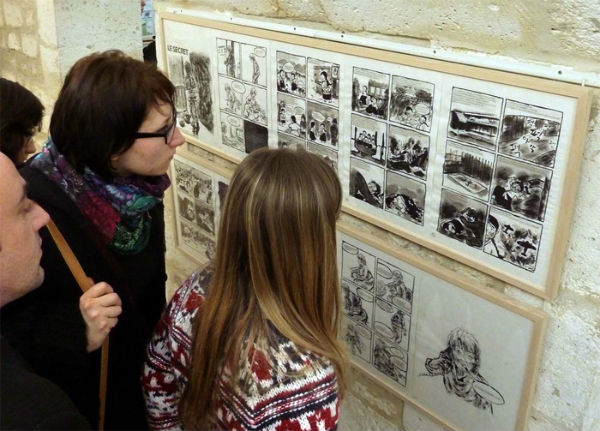2014 Angouleme International Comics Festival

South Korea’s exhibition on Korean enforced sex slaves by Japan during the Second World War at the Angouleme International Comics Festival (AICF), the largest one in Europe, was successfully held from January 30th to February 2nd, 2014. To commemorate the centenary year of the First World War, the 41st AICF exhibited cartoons dealing with the horrors of war and wartime sex abuse. As part of the festival, the Korean government also organized an exhibition about Korean comfort women that suffered at the hands of the Japanese military during the Second World War.
The AICF has occurred every year since 1974 in Angouleme, France, in the month of January. The festival is rooted in an exhibition named “Ten Million Videos”, a small exhibition composed by some cartoonists. It became a competition titled “Angouleme International Cartoon Festival” in 1976. In the 1980s, the festival has been recognized as one of the top five international cultural events, and passing over 2000s, it turned over the largest festival in Europe where more than 70% of cartoon information has been gathered.
This year, many cartoons were submitted telling stories about the world war and sexual violence during wartime. As a main event, Jaque Tardi’s cartoons which have a historical background of the First World War were exhibited. A cartoon with the title “She Met on the Road” received fervent responses from the audience. It is a story about discrimination and abuse against women. Mr. Frank Bondoux, the chairperson of the AICF, stated that through the 41st festival’s theme of the First World War, the world could reflect on our past and stamp out abuse against women.
South Korea also prepared a special exhibition under the title “Flowers that Never Fade” and the subtitle ”I’m the Evidence.” The Korean Cartoon Association exhibited 20 cartoons and 4 videos about the enforced sexual slavery. All of cartoons portrayed the tragic reality of comfort women victims by the Japanese army during the war. Those cartoons at the exhibition were well received by a number of visitors because of the truth about the victims and the value of the art works.
The French people I interviewed wanted to know whether all the cartoons were based on a true story or not because this sexual abuse was too hard to believe. They were really shocked with the reality of Japan’s brutality. They also wondered if these cartoons depict true historical facts, why Japan has not admitted to their misdeeds. They felt sadness for the comfort women especially considering their young age when they were forcefully mobilized and subjected to the cruel acts of the Japanese army. Roxane (23, University Student) said that to prevent this tragedy from occurring again, Japan should embrace the history as the way it is. Since the war affects people in their everyday life, we must realize what the war truly is. Charles (21, University Student) mentioned that it is easy to believe what Japan insists about history, because they appeal more than Korea does. To show the true history against Japan’s distorted history, the Korean government has to publicize it more often. By exhibiting the cartoons, we could let the world know about Japan’s brutality and the real history. Since the Korean comfort women are getting old, we do not have much time to verify their real history to the world. However, thanks to the 2014 AICF, we could explain the comfort women’s lives, their pain and also find a more effective approach for controlling these sensitive matters in a delicate way.
By Lee Go-eun, Overseas Correspondent

